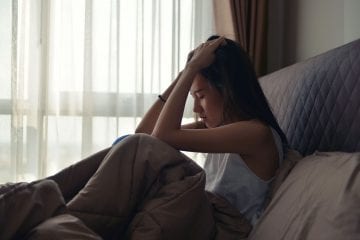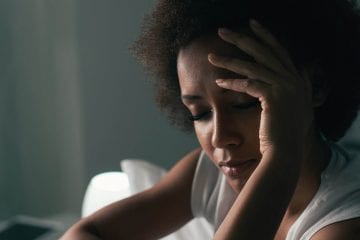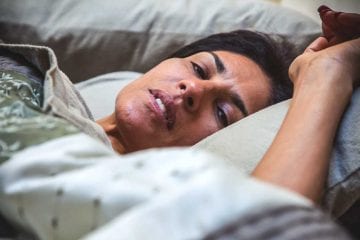Insomnia is a common occurrence among the elderly population. Some research even suggests that it affects over 50% of seniors.
Whilst it is common for one's sleeping patterns to adjust with age, the onset of insomnia is a greater issue that might require medical attention. Many sufferers of insomnia attempt to treat themselves and this can be a problem for elderly people receiving home care.
This article takes an in-depth look at insomnia in the elderly and provides some advice and tips on how to overcome it.
Table of Contents
What Is insomnia?
While many people have difficulty sleeping now and again, insomnia takes this difficulty to a completely different level. Insomnia involves difficulty both falling and staying asleep on a regular basis.
This inability to get quality sleep may be a result of medical or psychiatric conditions. Short-term insomnia generally lasts under a month; longer is classed as chronic insomnia.
Signs of insomnia in the elderly
Recognizing the signs and symptoms of insomnia in the elderly is important so that it can be addressed as soon as possible. Family members and carers of elderly people should be on the lookout for the following:
- Long time to fall asleep (30 and more minutes)
- Early awakening and inability to go back to sleep
- Multiple awakenings during the night
- Difficulty remembering things
- Irritability
- Problems focusing or concentrating
- Exhaustion, tiredness, drowsiness during the day
- Night falls or slips
- Waking up feeling tired.
Causes of insomnia in the elderly
Some common causes of insomnia in the elderly are:
- Depression - insomnia can be a sign of depression in seniors.
- Poor environment or habits - falling asleep in front of the TV or whilst using a mobile device, or irregular sleeping hours
- Sleep disorders - sleep apnea, snoring, and the restless legs syndrome can impair sleep.
- Drugs and medications - the side effects of some drugs or medications may cause sleeping difficulties.
- Lack of exercise or inactivity - many elderly people are not active enough to get a good night's sleep.
- Medical conditions - many medical conditions such as Alzheimer’s, arthritis, diabetes, heartburn, and menopause can interfere with sleep patterns. Pain can also make it difficult to fall and stay asleep.
Methods of treating insomnia in the elderly
Insomnia certainly becomes more common as we get older, as do other changes in sleep patterns that are associated with age such as sleeping and waking earlier, sleeping more lightly, and fewer hours of sleep needed.
However, insomnia that results in problems with functioning during the day should not be dismissed as a normal part of the ageing process.
Significant improvements in the quality of life, memory, and concentration can be achieved by addressing poor sleeping pattern in seniors. This can lead to less reliance on assistance with daily living tasks.
Exercise. Physical activity and exercise is often considered to be good treatment for insomnia. According to one study, however, it appears that exercise has limited benefits in comparison to CBT-I. Another recent comparison trial between Tai-chi and CBT-I found the latter to be a more effective treatment.
Of course, exercise is very important for maintaining overall health and wellness, but should not be relied on as the primary treatment for insomnia. Insomnia sufferers may well gain benefits from exercise, but a study reported by the New York Times indicates that it may take months of exercise before there is a positive effect on insomnia.
Mindfulness. A 2015 randomized control trial concluded that mindfulness meditation was better at improving sleep patterns in elderly sufferers of insomnia than sleep hygiene. The subjects of the study completed 2 hours of group-based mindfulness per week over 6 weeks.
Mindfulness can also be carried out individually, either locally or via online courses such as the one here. There are also various mobile applications that can help with mindfulness, such as the Headspace app.
Cognitive Behavioral Therapy for Insomnia (CBT-I). This therapy helps people avoid negative thought patterns that can trigger insomnia. It also promotes regular sleep habits, relaxation techniques, and other behaviors that help improve sleep patterns.
CBT-I has a good track record and was recently featured in the NY Times. One recent study confirmed that CBT-I also helps people who have a combination of insomnia and other medical or psychological conditions.
CBT-I can be practiced in person, as part of a group, or through online programs. Two programs that have been studied for clinical efficacy are SHUTi and Sleepio.
CBT-I incorporates techniques such as sleep restriction therapy and stimulus control.
Brief behavioral treatment of insomnia (BBTI) is an abridged version of CBT-I designed to be delivered over 4 weeks. Research has shown BBTI to be effective; one study found it to be particularly effective for reducing urination at night.
Avoid sedatives
Sedatives should only be used as a last resort after all other options of treatment have been explored. We are including them at the end of this section, because sedatives can very often be considered as a treatment for insomnia too early.
The majority of drugs and medications that cause sleepiness are bad for brain activity both in the short term and over extended duration. Taking medications such as benzodiazepines (alprazolam, diazepam, lorazepam, or temazepam) will lead to habits that will take a lot of effort to break.
Having said that, it is possible to reduce the use of benzodiazepines in the elderly. One randomized control study showed that some elderly patients on courses of benzodiazepines reduced reliance on the sleeping medication. Around 63% of those studied were completely drug free after 7 weeks. The average time during which the subjects of the study had been taking sleeping drugs was 19.3 years.
Of course, it becomes much more difficult to reduce levels of sedation when there are other complications involved. For instance, an elderly patient with Alzheimer’s might find it incredibly difficult to reduce sedation because their condition may deteriorate through being deprived of sleep. Almost all patients who reduce sedation initially feel an increase in restlessness.
However, even for those with complications such as Alzheimer’s there is still a dilemma, because the sedation impairs their brain function. This could lead to an increase in the speed of cognitive decline and increased risk of falling.
For carers of people who are taking benzodiazepines to help with sleep issues and do not have any complications such as Alzheimer's it is beneficial to try to reduce the sedatives while there are no complications. Even if there are such complications, carers should consult the doctor to devise a plan to reduce the drugs as quickly as possible.
Weaning off sedatives is possible and can be done through slow tapering off the drugs, supported by sleep-improving methods such as cognitive behavioral therapy.
Medications and supplements for insomnia
As mentioned, benzodiazepine drugs and sleeping medications carry risks when used for treating insomnia in the elderly. If someone in your care is already taking such medications for sleep, it is recommended that a process of tapering them off is started as soon as possible. Most people will eventually adapt better sleeping patterns without the drugs, but it may take more effort to wean off them initially.
Many sleep assisting over-the-counter (OTC) drugs and medicines can also be a problem as they tend to be anticholinergic. This means that they interfere with acetylcholine, an important neurotransmitter. Diphenhydramine, which goes by other brand names including Benadryl, is a commonly used anticholinergic. This is an antihistamine drug that provides sedation and is an ingredient in most nighttime analgesics.
Elderly people should be cautious about taking anticholinergics for aiding sleep and any other reason because of their effect on brain functioning; prolonged use of anticholinergics has been associated with the onset of dementia including Alzheimer’s disease.
Practically all sedatives have been included in recommendations to avoid certain medications for the elderly. Once you have checked out the medications that you should not be using, here are few that you might want to consider for treating insomnia in the elderly:
Trazodone. Trazodone is an older antidepressant that has a weaker sedating effect. Geriatricians have used this for quite some time as a ‘sleeping pill’. It is not anticholinergic, so it is a less risky alternative to other medications. A 2014 study found that taking trazodone was beneficial for improving sleep patterns in sufferers of Alzheimer’s disease.
Ramelteon. This synthetic drug mimics the effects of melatonin. Studies differ about the benefits of ramelteon. One study reported that ramelteon had the advantage of not impairing middle-of-the-night balance or memory in older adults. Another more recent study concluded that the clinical effects of ramelteon were insignificant.
Melatonin. This is a hormone associated with the sleep-wake cycle. Research has concluded that melatonin improves sleep in elderly adults and does not have withdrawal symptoms. But be careful when buying melatonin, as there is little regulation of its sale in the United States and this leads to poor quality products often being sold. Melatonin sold in Europe is subject to much stricter regulations and this results in better quality of product.
Conclusion
Insomnia is a common condition in the elderly and because of this can often get misdiagnosed as part of the normal ageing process. Around 42% of the population over 65 years of age suffer from insomnia, but this figure varies depending on the situation and assessment criteria.
Insomnia has a multifactorial etiology; it is common, but also not often recognized, and its effects can be underestimated. Prolonged insomnia can result in multiple negative side effects ranging from slips and falls to diseases and higher mortality.
Many elderly sufferers do not receive appropriate treatment and self-medication is common. Treatment of insomnia requires attention of a physician. It should also include meticulous evaluation of not only medical conditions, but also environmental and psychological factors.
The first step should be education - teaching the elderly about normal sleep patterns and sleep hygiene. CBT-I is an effective treatment and should always be considered as a first method of treatment, and certainly before any medication is given.
Medication should only be considered for treating insomnia once the risks have been fully weighed against the benefits.When insomnia is persistent, the advice of a psychiatrist or a sleep specialist should be sought.



